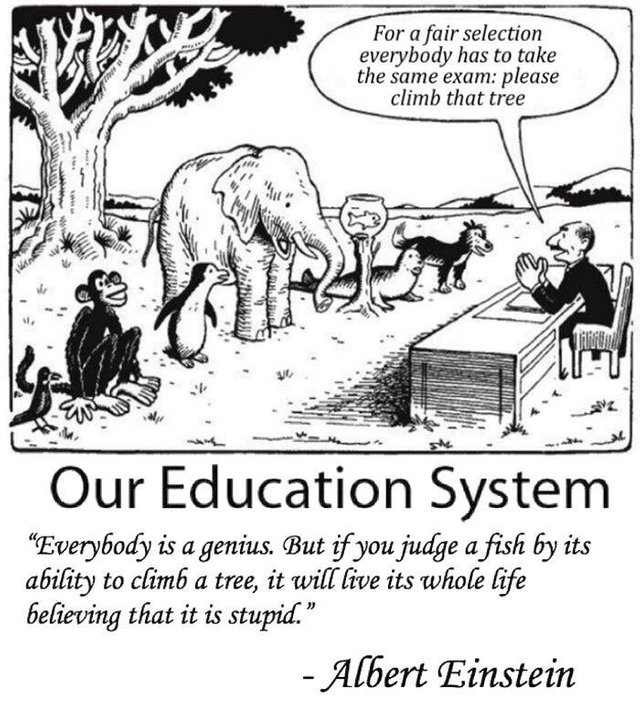It was the little boy's first day of school. He was very excited and couldn't wait to start learning new things. He was having a lovely day, and after Recess his teacher said, "Children, now we are going to do some drawing." Good! Thought the little boy. He loved drawing. He got out his pencils and was about to start drawing out a fantastic story about tigers and dragons, when the teacher said, "Wait! Today we are going to draw some flowers." Good! Thought the little boy, he loved flowers, and he began to draw all different sized flowers with beautiful shapes and colours. He drew some of the beautiful flowers his Mum grew in their garden. But then, the teacher said "Wait! Let me show you how to draw a flower. A good flower has five petals, with a green stem. You can colour the petals red." Okay, thought the little boy, I can draw a flower like that. So he drew a flower with five red petals and a green stem.
"Well done," said the teacher, pleased the little boy's second drawing.
The next day, after Recess, the teacher once again announced that they were going to do some drawing. Good! Thought the little boy, eager to draw something exciting. But before he had a chance to begin, the teacher said, "Wait! Today, we will draw a house." Great! Thought the little boy, and he began by drawing the backyard of his house first, with his dog inside the fence. But before he got far, the teacher said, "Wait! Let me show you how to draw a house. You can use a square for the main part, with a triangle for the roof. The door can be a rectangle and the windows some more squares." The little boy placed his first attempt in the rubbish bin when he realised it was not what the teacher wanted. He then set to work on a square house with a triangular roof.
When the little boy showed the teacher she said, "Beautiful work!" Good! Thought the little boy. As time went on, months in fact, the little boy realised each day after recess was time for drawing. He learnt to sit quietly and wait for the teacher to tell the class what to draw and how to draw it. The teacher was always very pleased with his work, as he listened very carefully to what she wanted. Then one day, something happened. The little boy's father got a job far away, so the little boy had to leave his school, and go to a new one near his father's new job.
The little boy liked his new school, and his new teacher was very nice. On his first day, the teacher said to the class, "Please get out some paper, it's time for some drawing." Good! Thought the little boy, and he sat patiently, waiting to be told what to do next. He waited for a while, then his teacher came up to him and said, "Johnny, why haven't you started your drawing?" "Because you haven't told us what we are going to draw," replied the little boy. "If I told you what to draw," said the teacher, "then everyone's picture would look the same and I wouldn't be able to tell them apart. The room would look fairly boring, don't you think?" "Oh," said the little boy, with a confused look on his face. Then the teacher said with a smile, "You can draw whatever you like." The little boy's face lit up. "Anything?" Asked the little boy. "Anything", said the teacher. Good! Thought the little boy happily, I can do that!
And he began to draw a flower with five red petals and a green stem.
Does schools kill creativity?
Sir Ken Robinson makes an entertaining and profoundly moving case for creating an education system that nurtures (rather than undermines) creativity.

Hi! I am a robot. I just upvoted you! I found similar content that readers might be interested in:
http://ehlt.flinders.edu.au/education/DLiT/2001/DLT.J&T/julieane/creative/creat02.htm
Downvoting a post can decrease pending rewards and make it less visible. Common reasons:
Submit
Very good story and it is true of society as a whole. I see it as my mission to move to the "fifth perspective" or something. Thanks for posting.
Downvoting a post can decrease pending rewards and make it less visible. Common reasons:
Submit
Einstein very much was an educational rebel. He is often considered someone that succeeded in spite of his education.
Having said this, a thought that I've had for a while now is, "How would Einstein have turned out had he not had to fight against his teachers?" This comes to mind because, as a teacher, I see many students come to me that have received encouragement, opportunities, and praise, but lack the tenacity to succeed when they face difficult problems on assignments.
I can't really make any intelligent, global statement about psychology or sociology, but I do think it is worth imagining how much Einstein's fight against the educational system, religious persecution, and tradition on the whole, lead him to be as powerful a thinker as he was.
Downvoting a post can decrease pending rewards and make it less visible. Common reasons:
Submit
observing the creative process of students can be taken by multiplying the exercise so that its development from time to time can be analyzed and your post is one way that can be taken to find out how creative students can draw
Downvoting a post can decrease pending rewards and make it less visible. Common reasons:
Submit
"Does schools kill creativity?"
:- No, people are.
Downvoting a post can decrease pending rewards and make it less visible. Common reasons:
Submit